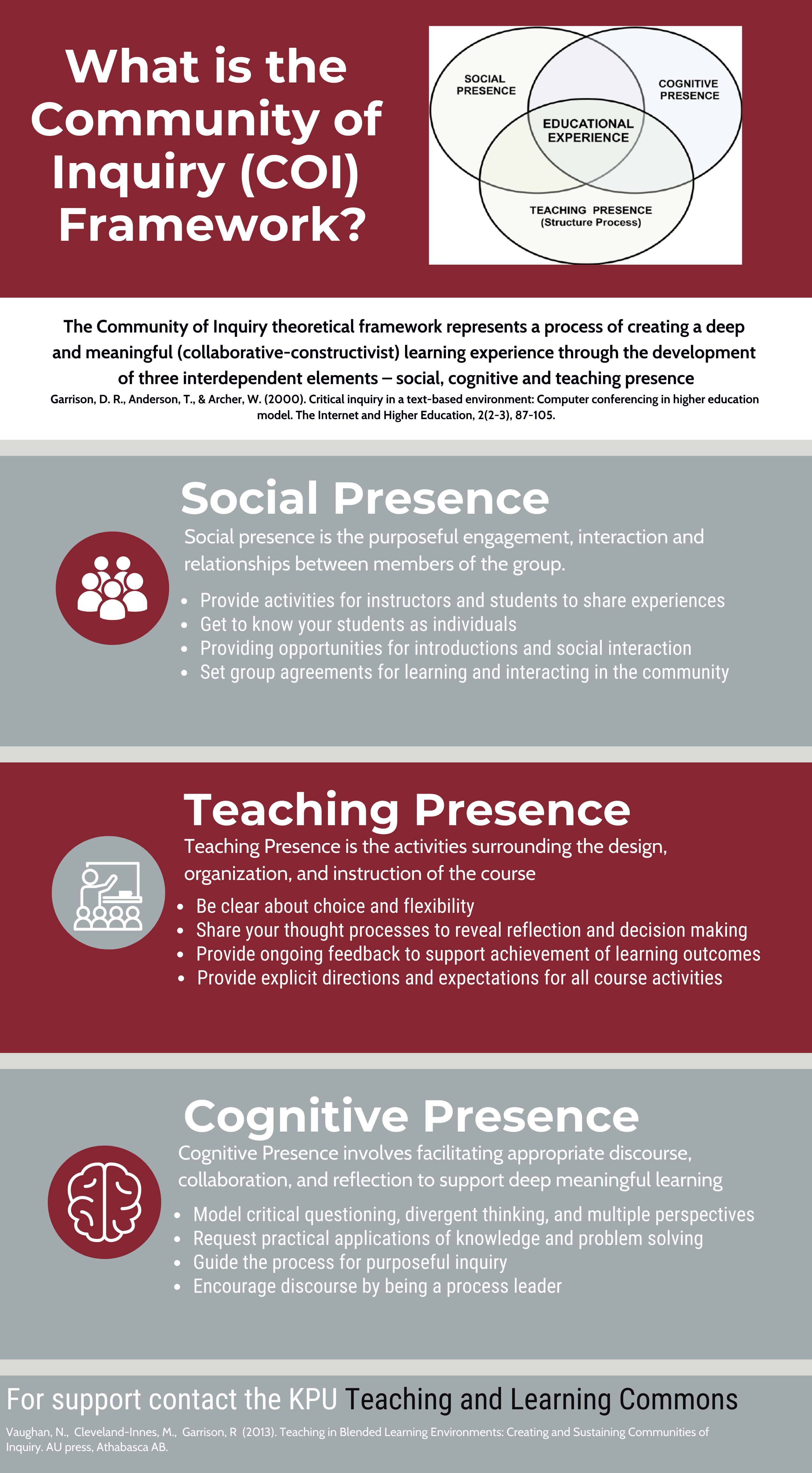3 Theoretical frameworks and conferencing tools
The application of conferencing tools in educational contexts requires the thoughtful underpinning of theoretical frameworks to support best practices. Like any Educational Technology (EdTech), conferencing tools should be selected to support pedagogical approaches and strategies. This chapter presents two theoretical frameworks that have been effectively applied to online learning and can support best practices using KPU’s supported conferencing tools. It is important to note that many theoretical frameworks can support online learning and conferencing tools, and only two are being presented in this chapter.
One of the most recommended theoretical frameworks by the KPU Teaching and Learning Commons is the Community of Inquiry (CoI) framework. The CoI framework represents “a process of creating a deep and meaningful (collaborative-constructivist) learning experience through the development of three interdependent elements – social, cognitive and teaching presence” (Garrison et al., 2000, p. 88). The CoI framework is directly applicable to conferencing tools as it “provides a dynamic model for an institutional approach to move away from a passive lecture that fundamentally reshaped the educational experience based on thinking and learning collaboratively” (Bektashi, 2018, para. 19). As general examples for application, cognitive presence involves facilitating appropriate discourse, collaboration, and reflection to support deep, meaningful learning. Social presence is the purposeful engagement, interaction and relationships between members of the group. Teaching presence is the activities surrounding the design, organization, and instruction of the course.
A second theoretical framework that can underpin the best pedagogical approaches when utilizing conferencing tools is the Online Collaborative Learning Theory (OCL). Harasim (2012) proposed the OCL theory, which “focuses on collaborative learning, knowledge building, and internet use as a means to reshape formal, non-formal, and informal education for the Knowledge Age” (p. 81). Harasim (2020) underscored the importance of three critical phases of knowledge construction through discourse, including idea-generating, idea organizing, and intellectual convergence.
Link: KPU COI Resources

References:
Bektashi, L. (2018, July 09). Community of Inquiry Framework in Online Learning: Use of Technology. licensed under CC 4.0. https://techandcurriculum.pressbooks.com/chapter/coi-and-online-learning/
Conrad, D. (2014). Interaction and communication in online learning communities: Toward and engaged and flexible future. In O. Zawacki-Richter, & T. Anderson (Eds.), Online Distance Education: Toward a Research Agenda, (pp. 381-402). Athabasca, AB: AUPress.
Garrison, D. R., Anderson, T., & Archer, W. (2000). Critical inquiry in a text-based environment: Computer conferencing in higher education model. The Internet and Higher Education, 2 (2-3), 87-105.
Kelly, R. (2014, January 7). Creating a Sense of Instructor Presence in the Online Classroom. Faculty Focus. https://www.facultyfocus.com/articles/online-education/creating-a-sense-of-instructor-presence-in-the-online-classroom/
Vaughan, N. D., Cleveland-Innes, M., & Garrison, D. R. (2013). Facilitation in Teaching in blended learning environments: Creating and sustaining communities of inquiry. Athabasca University Press.

